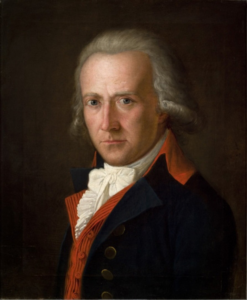Enjoyment of nature
(Poet's title: Naturgenuss)
Set by Schubert:
D 188
[May 1815]
D 442
for TTBB quartet and piano[January 1822?]
Im Abendschimmer wallt der Quell
Durch Wiesenblumen purpurhell,
Der Pappelweide wechselnd Grün
Weht ruhelispelnd drüber hin.
Im Lenzhauch webt der Geist des Herrn!
Sieh! Auferstehung nah und fern,
Sieh! Jugendfülle, Schönheitsmeer
Und Wonnetaumel rings umher!
Ich blicke her, ich blicke hin,
Und immer höher schwebt mein Sinn.
Nur Tand sind Pracht und Gold und Ruhm,
Natur, in deinem Heiligtum!
Des Himmels Ahnung den umweht,
Der deinen Liebeston versteht;
Doch, an dein Mutterherz gedrückt,
Wird er zum Himmel selbst entzückt.
In the evening glow the spring flows
Through crimson bright meadow flowers,
The changing green of the poplar willows
Blows about overhead, whispering peacefully.
The spirit of the Lord is weaving through the breath of spring!
Look! Resurrection nearby and far away,
Look! The fullness of youth, a sea of beauty,
And a frenzy of delight all around.
I glance this way, I glance that way,
And my mind floats ever higher.
Splendour, gold and glory are just worthless,
Nature, in your sanctum!
An awareness of heaven surrounds
Anyone who understands your music of love;
But, pressed to your motherly heart,
He will be carried off enchanted to heaven itself.
All translations into English that appear on this website, unless otherwise stated, are by Malcolm Wren. You are free to use them on condition that you acknowledge Malcolm Wren as the translator and schubertsong.uk as the source. Unless otherwise stated, the comments and essays that appear after the texts and translations are by Malcolm Wren and are © Copyright.
☙
Themes and images in this text:
Breath and breathing Emptiness and fullness Evening and the setting sun Fields and meadows Fire Flying, soaring and gliding Flowers Frenzy and lack of control Gazes, glimpses and glances Ghosts and spirits Gold Green Hearts Heaven, the sky Here and there High, low and deep Magic and enchantment Mother Nature Near and far Pilgrims and pilgrimage Poplars Red and purple Resurrection The sea Spring (season) Springs, sources and fountains Swaying and swinging Weaving Weeping willows Whispering Youth
Most lyrics of this type that reflect on the setting sun lead to thoughts of mortality. The sky blazes but the light soon dies down as the shadows take over; this is usually the time for thoughts of autumn, old age and hopes of a new (but perhaps distant) dawn. Matthisson’s Naturgenuss is extraordinary in that it is about spring. The purple light of sunset is actually bright and it illuminates colourful flowers. The changing shades of green in the poplar-willows are still visible. The poet looks around and what strikes him is the energy of new life: resurrection is on full view in a sea of beauty. It is the fullness and energy of youth, not age and decay, that we are invited to contemplate this evening.
The poet’s ability to see the effect of spring all around leads him into a frenzy or ecstasy: seeing leads to a vision. The more he pays attention to what is actually here, the higher he feels that he is being lifted above it all. By pressing himself fully down to earth (on nature’s motherly heart) he is raised to heaven. Ecstasy (which in Greek meant something like ‘standing outside’ or ‘standing apart’) comes from paying close attention to what is here now, not from escaping from it.
☙
Original Spelling Naturgenuß Im Abendschimmer wallt der Quell Durch Wiesenblumen purpurhell, Der Pappelweide wechselnd Grün Weht ruhelispelnd drüber hin. Im Lenzhauch webt der Geist des Herrn! Sieh! Auferstehung nah' und fern, Sieh! Jugendfülle, Schönheitsmeer, Und Wonnetaumel rings umher! Ich blicke her, ich blicke hin, Und immer höher schwebt mein Sinn. Nur Tand sind Pracht und Gold und Ruhm, Natur, in deinem Heiligthum! Des Himmels Ahnung den umweht, Der deinen Liebeston versteht; Doch, an dein Mutterherz gedrückt, Wird er zum Himmel selbst entzückt!
Confirmed by Peter Rastl with Gedichte von Friedrich von Matthisson. Erster Theil. Tübingen, bei Cotta, 1811, page 17; and with Friedrich von Matthisson, Schriften , Erster Band, Zurich: Orell, Füßli & Co., 1825, pages 15-16.
To see an early edition of the text, go to page 72 [76 von 192] here: http://digital.onb.ac.at/OnbViewer/viewer.faces?doc=ABO_%2BZ170963109


